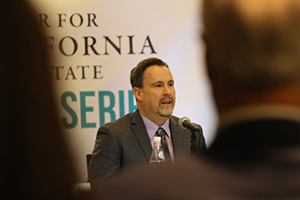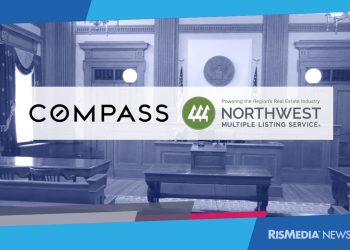Ask any agent, broker or constituent in real estate: There are challenges facing the Multiple Listing Service.
A discussion on the future of the MLS—what it can be, and what it should be—hosted by the California Association of REALTORS® (C.A.R.) recently illuminated those issues, and strived for solutions.
“An MLS should be defined not only by its data, but its access to the data, so brokers can get easy access to and keep the products and services they want and not necessarily what the MLS decides to provide to its members,” said Rebecca Jensen, CEO and president of Midwest Real Estate Data LLC (MRED), during the discussion, held on Jan. 10 in Los Angeles.
Jensen is board chair of The MLS Grid—a consistent data feed, licensing and rules for brokers, MLSs and vendors—as well as on the board of the Broker Public Portal (BPP). The BPP and The MLS Grid are two of a few initiatives in play, along with Upstream, which is backed by the National Association of REALTORS® (NAR) and Realtors Property Resource® (RPR®).

Addressing the inefficiencies is key, the panel said.
“Our goal is to really work on the challenges…to find a way, through the efforts of all these organizations, to provide consistent data efficiency, to try to break down data silos that are huge pain points in brokerage communities,” said Jeremy Crawford, CEO of the Real Estate Standards Organization (RESO), which has developed data standards used by hundreds of associations, brokerages, MLSs and vendors.
“As someone who lists and sells real estate, I need it to be more efficient—I need to not have to go multiple sources,” said Jeanne Radsick, broker of CENTURY 21 Tobias Real Estate in Bakersfield, Calif., and member of the National Association of REALTORS® (NAR) Mergers & Consolidations Task Force. “I think the first step is we need to have one system.”

“We are playing a long game,” said Mark McLaughlin, CEO of Pacific Union International, based in the Bay Area and a member of 12 MLSs. “The solution for our businesses to drive efficiencies and economies of scale is very important to us, especially in the race to zero. The only way to do that is to have one database.”
“It’s all about how you define ‘one database,'” however, said Craig Cheatham, CEO and president of The Realty Alliance, a brokerage network that includes Douglas Elliman Real Estate and HomeServices of America. “As I talk to our brokers, it’s not about one MLS or one database; it’s ‘I just want to have access to my data, or my marketplace’s data.'”
Is it beneficial, even, for the existing inefficiencies to be streamlined?
“Fundamentally, the MLS needs to serve ,” said David Silver-Westrick, partner at Keller Williams OC Coastal Realty in San Clemente, Calif. “We serve them less and less with every year—not because we don’t intend to solve their problems, but because the world has moved on, and we’re unwilling to…reimaging our relationship with consumers, and agents’ relationships with consumers, has got to be at the base of what we do.”
“Meeting the consumer where they are, but empowering the agent with more data—that’s available through these silos that we’re trying to break down—will make the MLS more valuable than it is today,” said Quincy Virgilio, broker associate of Coldwell Banker Residential Brokerage in San Jose, Calif.
Concerning, however, is the pace of progress.
“There’s an opportunity that is fast fading in the MLS community as a whole to make meaningful change, and if we do not do it shortly, then we will forever be chasing others that will most likely take the handles and move forward,” said Art Carter, CEO of the California Regional Multiple Listing Service (CRMLS) and chair of RESO.
Is the answer consolidation? Archaic hierarchies are a hurdle, with resistance starting at the top, according to a few panelists.
“The issue boils down to an obvious reality,” said Wes Burk, broker/owner of Patterson Realty in San Luis Obispo, Calif. “I think that the MLS structure itself is a legacy organizational chart, and I think it’s led fundamentally to a bureaucratic roadblock to what should be our primary objective, which is serving the consumer.”
“The people that sit on those boards don’t have the broader view that others have… not as well informed as they need to be, and it goes all the way through the system,” Radsick said.
Fear is another obstacle.
“It’s really human factors that stand in the way of this—of greater cooperation and consolidation,” said David Charron, chief strategy officer of Bright MLS, which is a consolidation of nine Mid-Atlantic MLSs. Bright MLS adheres to the RESO Data Dictionary.
“The elephant in the room is a lot of people are employed doing this stuff,” Silver-Westrick said. “A lot of people are employed at the local board level, the MLS level—the pushback we get is natural enough. ‘Yes, I’m willing move towards the future, so long as I’m still here.’ I think what we have to discuss is a lot more revolutionary than evolutionary. We’re talking about perfecting a VCR in a world of streaming and virtual reality. We need to leapfrog that. What do you do about the career incentives of the very talented people working in MLSs that say we can do this better, but we want to still be here?”
“The reality is that those people are so protective of their jobs,” said Sandra Deering, broker of record for Coldwell Banker Residential Brokerage Southern California. “People who sit on the board of directors of MLSs have great intentions, but they don’t have the bandwidth to see beyond their day-to-day operation.”
“There’s fear in association-owned MLSs that they may lose revenue,” Virgilio said. “Let the association use what they want to lay on top of the database. They can serve their subscribers and clients in any way they think best, but put the data in one spot. It’s a matter of getting past that fear.”
As a construct, the MLS is still valuable, agreed the majority of panelists. Across the board, collaboration—and compromise—is needed.
“We have to remember that the MLS is a terrific concept,” said Dale Ross, CEO of RPR. “That should not be thrown out—that has to be enhanced.”
“If you have a hand in creating your future, even if you get 85 percent of what you want, that’s still enough to move forward,” Jensen said.
“We get tension between who does the resolution,” Cheatham said. “Is it Grid? Is it Upstream? Is it RPR? We need to be in a room and be open to letting go of our project…It can’t be the superstars of the MLS world again and again talking about the problem and getting painted with a broad brush. We’ve got to be open, because our industry is at stake.”
Readers: What is the fate of the MLS? What improvements are needed? Comment to share your thoughts.
 Suzanne De Vita is RISMedia’s online news editor. Email her your real estate news ideas at sdevita@rismedia.com. For the latest real estate news and trends, bookmark RISMedia.com.
Suzanne De Vita is RISMedia’s online news editor. Email her your real estate news ideas at sdevita@rismedia.com. For the latest real estate news and trends, bookmark RISMedia.com.











